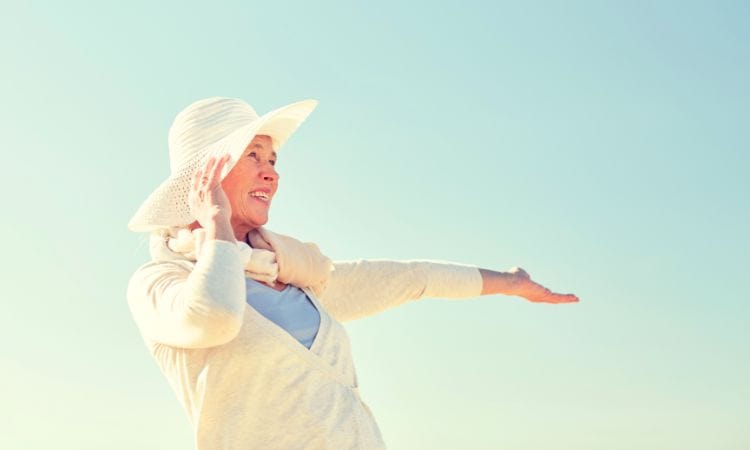Sunshine is in abundance during Florida summers. While sunshine offers many health benefits, it’s essential for active seniors to enjoy responsibility while taking precautions against harmful UV rays.
Let’s explore how seniors can embrace outdoor activities while protecting their skin.
The Benefits of Sunshine
Sunshine isn’t just a source of warmth and light — it plays a vital role in senior health and well-being:
- Vitamin D Synthesis: Sunlight helps the body produce vitamin D, essential for bone health and immune function. As we age, maintaining bone health becomes increasingly important. Sunlight exposure triggers the production of vitamin D in the skin, crucial for calcium absorption and bone strength. Adequate vitamin D levels also support immune function, helping seniors ward off infection and illness.
- Mood Boost: Exposure to sunlight can improve mood and alleviate symptoms of depression or seasonal affective disorder, common among older adults. Sunlight has a remarkable effect on mental health — the sun’s rays stimulate the production of serotonin, a neurotransmitter associated with mood regulation and feelings of well-being. Regular exposure to sunlight can uplift spirits and improve overall quality of life.
- Physical Activity: Outdoor activities like walking, gardening, or playing sports help seniors stay physically active, enhancing mobility and overall fitness. Outdoor activities are a cornerstone of healthy aging. Whether it’s a brisk walk in the park, tending to a garden, or enjoying a round of golf, being active outdoors helps seniors maintain mobility, strength, and cardiovascular health. Physical activity reduces the risk of chronic diseases like heart disease, diabetes, and osteoporosis.
Protecting Aging Skin
To enjoy the sun safely, here are some essential tips for protecting aging skin:
- Use Sunscreen: While this seems obvious, many seniors don’t apply sunscreen thoroughly or often enough. Sunscreen applied to exposed skin every morning is a healthy habit to start at any age. When exposing yourself to the sun, be sure to apply a broad-spectrum sunscreen with SPF 30 or higher to all unprotected skin, including the face, ears, neck, arms, legs, hairline and head. Reapply every two hours, or more frequently if swimming or sweating.
- Seek Shade: Limit direct sun exposure during mid-day. Seek out shaded areas under trees or awnings and wear a hat for additional protection.
- Wear Protective Clothing: Opt for lightweight, long-sleeved shirts, pants, and wide-brimmed hats to shield exposed skin from UV rays. Darker colors and tightly woven fabrics offer better protection from UV rays.
- UV-Protective Sunglasses: Choose sunglasses that block 100% of UVA and UVB rays to protect eyes and the sensitive skin around them. Look for sunglasses labeled with UV protection when purchasing.
- Stay Hydrated: Drink plenty of fluids, especially water, to keep skin healthy and prevent dehydration, which can exacerbate health issues and affect overall well-being. Aging diminishes the body’s ability to conserve water, so hydration is particularly important in warmer weather or during prolonged outdoor activities.
Enjoying Outdoor Activities Safely
Active seniors can still enjoy a variety of outdoor activities while minimizing sun exposure:
- Morning or Late Afternoon Walks: Schedule walks or exercise sessions during cooler parts of the day to avoid the strongest sunlight – ideally before 10am and after 4pm. These times offer cooler temperatures and reduced UV exposure.
- Gardening and Outdoor Hobbies: Enjoy outdoor hobbies such as gardening, birdwatching, photography, and other interests that connect you with nature as well as keep you active. Choose early morning or shaded areas to minimize sun exposure while enjoying the outdoors.
- Outdoor Sports: Participate in low-impact sports like golf, swimming, or gentle yoga sessions outdoors. If playing more active sports like tennis or pickleball, schedule matches during cooler parts of the day and take breaks in shaded areas to cool down and rehydrate.
- Socializing Outdoors: When attending outdoor picnics, barbecues, or gatherings, seek refuge under shaded structures or canopies. This allows for safe social interaction while protecting against excessive sun exposure.
Monitoring Skin Health
It’s crucial for seniors to monitor their skin for any changes, such as new moles or spots. Promptly consult a dermatologist if you notice any abnormalities.
By combining these strategies, seniors can benefit from the sun’s positive effects while guarding skin health and maintain a balanced and fulfilling lifestyle throughout every season.

